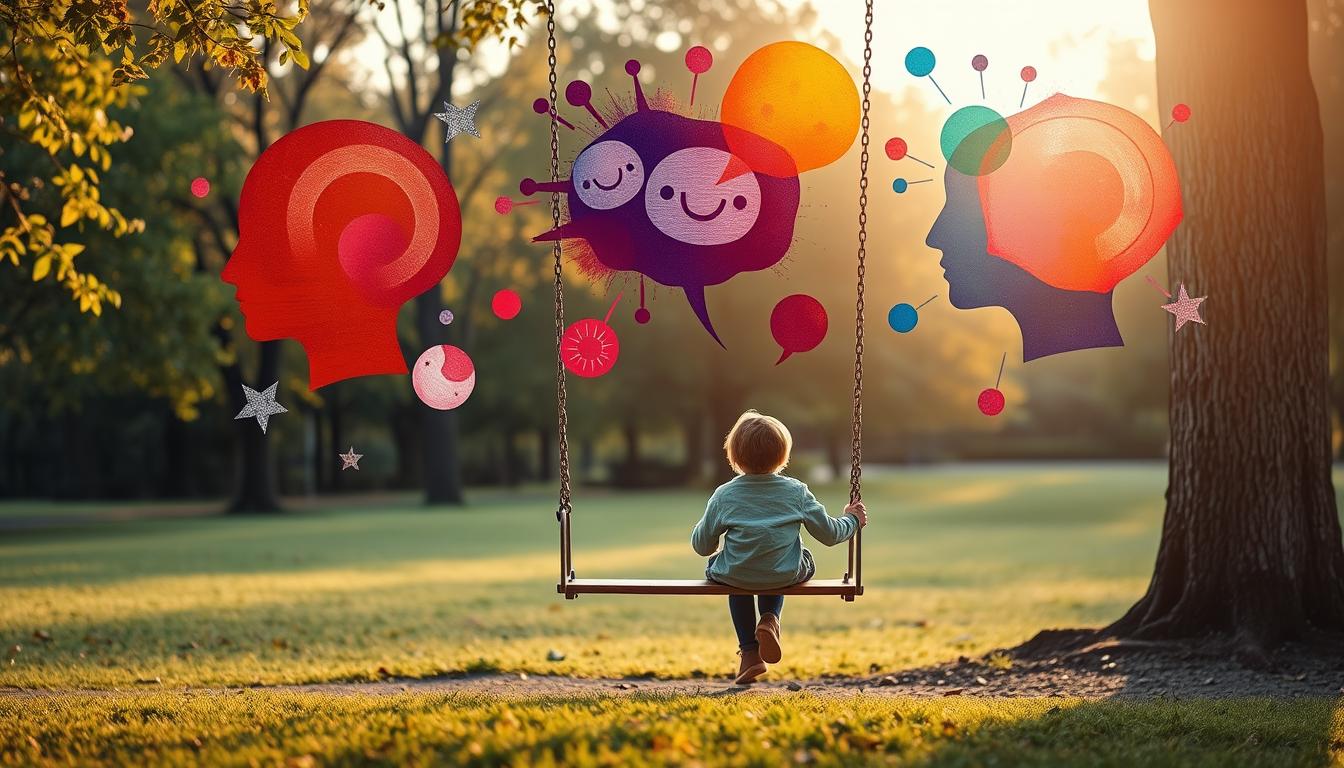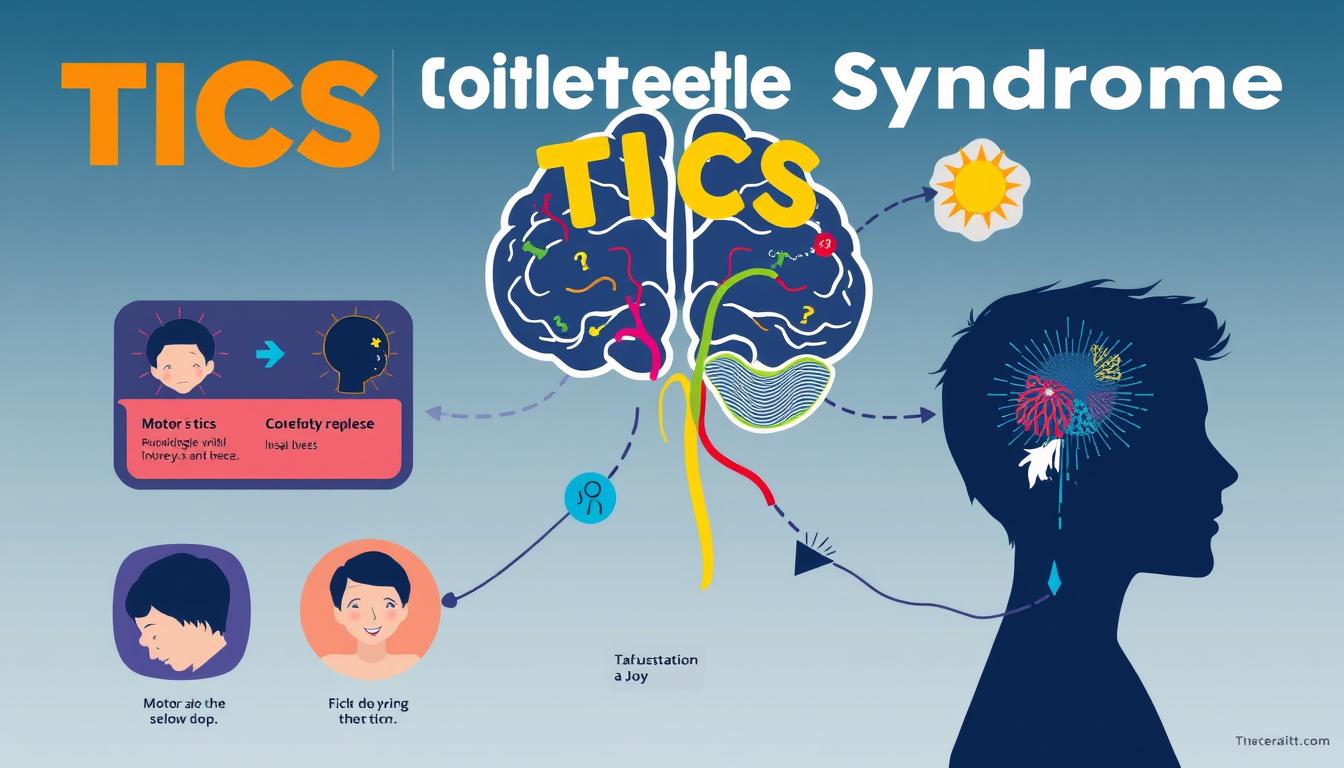Schizophrenia is a complex mental health issue that deeply affects young people and their families. It’s important for us to understand this disorder, even more so when it happens during adolescence. This guide will dive into schizophrenia in teens, covering early signs, treatment, and support needed to face this challenge.
Key Takeaways
- Schizophrenia in adolescents presents unique challenges compared to adult-onset cases, requiring specialized understanding and care
- Early detection and intervention are key to better outcomes for young people with schizophrenia
- Spotting early signs of schizophrenia in teens is critical for timely help
- Effective treatment includes both medication and therapy to manage the condition
- Family support and community resources are essential for recovery and managing schizophrenia in youth
What is Schizophrenia in Adolescents: Defining Early-Onset Psychosis
Schizophrenia is a complex mental health disorder that can show up differently in teens than in adults. Early-onset psychosis, or childhood-onset schizophrenia, happens when symptoms start before 18. This early stage is tough because the brain is changing a lot during this time.
Key Differences Between Adult and Adolescent Schizophrenia
While schizophrenia symptoms like hallucinations and delusions are the same, how they show up and get worse can differ in teens. Teen schizophrenia often hits harder on social and thinking skills. It also gets worse faster than in adults.
Common Misconceptions About Youth Schizophrenia
Many people think schizophrenia in teens is rare. But, it’s actually common, affecting about 1 in 4,000 kids and teens. Another myth is that teen schizophrenia is the same as adult schizophrenia. But, teens face unique challenges that need special care.
The Impact on Brain Development
When schizophrenia starts in teens, it can really mess with brain development. It can stop important brain changes like making connections between brain cells. This can lead to big problems with thinking, feeling, and getting along with others. It can hurt a teen’s school work, social life, and overall happiness.
| Key Differences | Adult Schizophrenia | Adolescent Schizophrenia |
|---|---|---|
| Onset | Typically in early to mid-adulthood | Onset before the age of 18 |
| Symptom Presentation | More stable and consistent | More fluctuating and variable |
| Cognitive Impairments | Less pronounced | More severe and debilitating |
| Social Functioning | May be more preserved | Often more significantly impaired |
| Prognosis | Generally better | Poorer long-term outcomes |
It’s key to understand early-onset psychosis in teens to help them better. By focusing on their unique needs, we can improve their future and make their lives better.
Recognizing Early Warning Signs in Teenagers
Spotting the early signs of schizophrenia in teens is key for early help and better results later on. As parents, teachers, and doctors, we need to watch for small changes in behavior, thinking, and social skills. These signs might show that a teen is starting to develop this serious mental health issue.
Look out for changes in how a teen acts. They might pull back from friends, lose interest in things they used to love, or do worse in school. They could also have trouble focusing, forget things, or struggle to solve problems.
Also, watch for big mood swings or feeling disconnected from the world. These are signs of early psychosis in young people. Noticing these small changes early can help us get them the help they need fast.
- Behavioral changes, such as social withdrawal and disinterest in activities
- Cognitive symptoms, including difficulty concentrating and memory issues
- Emotional shifts, like irritability, mood swings, and a sense of detachment
By knowing the early signs and acting fast, we can greatly improve a teen’s chances of managing schizophrenia well. This leads to better outcomes in the long run.
The Critical Role of Early Detection and Intervention
Early detection and intervention are key in managing youth mental health issues like schizophrenia. The time to treat effectively is short. Quick action can greatly improve the future for young people with this disorder.
Window of Opportunity for Treatment
Schizophrenia often starts in the teen years, a time of fast brain growth. Spotting early signs and acting fast can use the brain’s flexibility. This is vital for the best outcome for young patients.
Benefits of Early Diagnosis
Early diagnosis in adolescent schizophrenia brings many benefits. It means getting the right treatment on time. It also helps avoid serious symptoms and hospital stays.
Early help lets young people keep up with school, friends, and personal growth. It helps them manage their condition and live well every day.
Impact on Long-term Outcomes
Many studies show early treatment in adolescent schizophrenia leads to better long-term results. Young people who get help early tend to manage symptoms better. They also do well in school, work, and social life.
This leads to a better life quality and more independence. It helps them feel more self-sufficient.
“Timely intervention in adolescent schizophrenia can be a game-changer, unlocking the door to a brighter future for young individuals and their families.”
Understanding Prodromal Symptoms in Youth
Understanding the early signs of schizophrenia in teens is key. The prodromal phase is when symptoms start to show before a full psychotic episode. These signs can be subtle and easy to miss. But catching them early can help manage the condition better.
Teens with early psychosis might start to pull away from friends and family. They might also struggle in school, finding it hard to focus. These changes can be early signs of something more serious.
- Unusual sensory experiences, such as heightened sensitivity to sounds, smells, or lights, can also be an early warning sign.
- Cognitive changes, like difficulty concentrating or processing information, are another common prodromal symptom.
- Emotional fluctuations, such as increased irritability, apathy, or mood swings, may also be an indication that something more serious is brewing.
It’s easy to confuse these symptoms with normal teenage behavior. That’s why spotting them early and getting help is so important. Early action can stop these symptoms from getting worse, helping the teen’s future.
| Prodromal Symptom | Description |
|---|---|
| Social Withdrawal | Gradual retreat from friends, family, and social activities |
| Cognitive Changes | Difficulty concentrating, processing information, and maintaining focus |
| Emotional Fluctuations | Increased irritability, apathy, or mood swings |
| Sensory Experiences | Heightened sensitivity to sounds, smells, or lights |
By spotting these early signs and acting fast, we can help teens and their families. It’s a tough journey, but with the right support, they can face it. This way, we can help them have a brighter future.

Positive and Negative Symptoms in Teen Schizophrenia
Schizophrenia in teens can show up in many ways. It’s key to know the difference between positive and negative symptoms. Positive symptoms include things like hallucinations and delusions. These are abnormal thoughts or behaviors.
Negative symptoms, on the other hand, are when normal functions are missing or lessened. This can include social withdrawal and changes in emotions.
Understanding Hallucinations and Delusions
Hallucinations are when someone sees or hears things that aren’t there. This can be hearing voices or seeing visions. It’s a common symptom in teen schizophrenia.
Delusions are when someone believes something that is not true. These beliefs are fixed and not based on reality. They can make it hard for the person to understand what’s real.
Social Withdrawal and Emotional Changes
Negative symptoms can also be tough for teens with schizophrenia. They might pull away from friends and social activities. This can make it hard for them to connect with others.
They might also have trouble showing emotions. This can make it hard for them to feel connected and find happiness in daily life.
Cognitive Impact and Academic Performance
Schizophrenia can also affect a teen’s ability to learn. Problems with attention, memory, and thinking can make schoolwork hard. This can lead to lower grades and trouble in school.
It’s important to help teens with schizophrenia early. This can help them do well in school and reach their goals.
“Recognizing the unique presentation of schizophrenia in teenagers is essential for providing comprehensive, tailored support and improving long-term outcomes.”
Diagnosis Process and Professional Assessment
Diagnosing schizophrenia in teens needs a team of mental health experts. This team works together to make sure the diagnosis is right. They create a treatment plan that fits the young person’s needs.
The first step is a detailed psychiatric evaluation. A licensed clinician talks with the teen about their symptoms, health history, and family mental health. They look for signs of psychotic symptoms like hearing voices or seeing things that aren’t there.
- Psychological testing: Standardized tests check the teen’s thinking, feelings, and social skills.
- Physical examination: A full physical check, including tests, makes sure there’s no hidden health issue.
- Imaging studies: MRI or CT scans might be used to see if there are any brain changes linked to schizophrenia.
Diagnosing mental health issues in teens is very careful work. Mental health experts must think about the teen’s age and challenges. They also consider how schizophrenia might affect their life.
| Assessment Tool | Purpose |
|---|---|
| Structured Clinical Interview (SCID) | Comprehensive evaluation of psychiatric symptoms and disorders |
| Positive and Negative Syndrome Scale (PANSS) | Measurement of positive, negative, and general psychopathology symptoms |
| Scale of Prodromal Symptoms (SOPS) | Assessment of early warning signs and prodromal symptoms |
Working with a team of skilled professionals is key. It helps families get a correct diagnosis for their teen. This is the first step towards effective care and support.
Treatment Options and Management Strategies
Managing schizophrenia in teens requires a detailed plan. This plan includes antipsychotic medications and psychosocial interventions. These are tailored to meet the needs of young patients.
Medication Approaches for Adolescents
Antipsychotic medications are key in treating teen schizophrenia. They help reduce symptoms like hallucinations and delusions. But, it’s important to watch for side effects closely.
Therapeutic Interventions
Along with meds, psychosocial interventions are very helpful. These include cognitive-behavioral therapy (CBT) and family therapy. They help manage symptoms and improve social skills.
Family Support Programs
Family support is vital for teens with schizophrenia. Family therapy and education help families cope and support their loved one. This support is key for recovery.
| Treatment Approach | Description | Key Benefits |
|---|---|---|
| Antipsychotic Medications | Prescription drugs that help alleviate positive symptoms | Reduction in hallucinations, delusions, and disorganized thoughts |
| Cognitive-Behavioral Therapy (CBT) | Psychotherapy that helps manage symptoms and develop coping strategies | Improved emotional regulation, problem-solving skills, and overall functioning |
| Family Therapy | Therapy that involves the patient’s family to improve communication and support | Stronger family bonds, better understanding of the condition, and enhanced caregiver well-being |
Using a mix of these treatments, healthcare teams can help teens with schizophrenia. They can manage symptoms, improve well-being, and reach their goals.
Supporting Teens Through School and Social Life
Adolescence is tough, but even tougher for teens with schizophrenia. The right support can help them do well in school and keep friends. Let’s look at how we can support our youth with youth mental health and teenage psychotic disorders.
Fostering a Supportive School Environment
It’s key to work with schools to help a teen with schizophrenia. This means:
- Creating an Individualized Education Plan (IEP) or 504 Plan for learning help
- Getting extra time for assignments, tests, and projects
- Finding a quiet spot for studying or breaks
- Working with teachers for notes, recordings, or learning aids
Nurturing Social Connections
Keeping friends is hard for teens with teenage psychotic disorders. But it’s vital for their happiness. Encourage your child to:
- Join clubs or activities they like
- Have friends over for safe hangouts
- Find a peer mentor or support group
- Play sports or exercise to build friendships
By supporting them at school and helping them make friends, we can help youth with mental health challenges succeed.

“With the right support, teenagers with schizophrenia can overcome the challenges they face and lead fulfilling lives.”
The Family’s Role in Recovery and Management
Dealing with adolescent schizophrenia is a journey for the whole family. We all play a key role in helping our teenager get better and manage their condition. It’s a big challenge, but together, we can make a difference.
Creating a caring and understanding home is vital. We need to learn about psychosocial interventions like family therapy and support groups. These can greatly improve our teen’s life. By being involved in their adolescent psychiatric care, we help them feel safe and hopeful.
It’s also important to look after the emotional health of everyone in the family. Living with schizophrenia can be tough. So, we must take care of ourselves and support each other. Talking openly, having family meetings, and getting counseling can help us all cope better.
“The family’s role in the recovery and management of adolescent schizophrenia cannot be overstated. By providing a stable, supportive environment and actively participating in the treatment process, we can make a profound difference in the teen’s overall well-being and long-term outcomes.”
We’re not facing this alone. Working with the teen’s healthcare team, schools, and community groups helps us build a strong support network. This way, our family can grow stronger, even with the challenges of this condition.
Living with Childhood-Onset Schizophrenia: Daily Challenges
Living with childhood-onset schizophrenia is tough for teens. They must handle medication, find ways to cope, and build a strong support network. It’s a journey filled with unique challenges that need a careful approach.
Managing Medication Routines
Following a strict medication schedule is key for teens with this disorder. It’s hard for them to stay disciplined and organized. To help, setting up a routine, using pillboxes, and getting family support is important.
Developing Coping Strategies
Teens with this disorder need to learn how to deal with their feelings and thoughts. They can try relaxation techniques like meditation or deep breathing. They also need healthy ways to handle stress and social issues.
Building Support Networks
Having a strong support system is critical for these young people. They can join peer groups, go to family therapy, and find understanding teachers or mentors. These connections offer emotional, practical, and social support.
By tackling these challenges head-on, teens with childhood-onset schizophrenia can overcome them. With the right support and strategies, they can lead happy and fulfilling lives.

“The path to recovery is not always linear, but with the right support and resources, individuals with childhood-onset schizophrenia can learn to manage their symptoms and live fulfilling lives.”
Understanding Legal Rights and Educational Accommodations
Understanding the legal rights and educational accommodations for students with schizophrenia is key. In the United States, laws protect young people with this condition. They ensure these students get the support they need in school.
The Individualized Education Program (IEP) is a big help. It’s a plan made just for a student with a disability like schizophrenia. It lists the educational and related services they should get. This can include special instruction, counseling, and technology to help them.
Section 504 of the Rehabilitation Act of 1973 is also important. It requires schools to make changes so students with disabilities can learn equally. Students with schizophrenia might get things like more time on tests or special seating.
- Getting a good IEP or Section 504 plan is very important for students with schizophrenia.
- These laws help students with mental health issues do well in school.
- By knowing their rights and working with teachers, families can help their kids succeed.
As we focus on adolescent psychiatric care and youth mental health, we must remember the importance of legal rights and school support. By fighting for what they need, we can help these young people reach their goals.
“With the right support and accommodations, students with schizophrenia can succeed academically and socially, just like their peers.”
Conclusion
Schizophrenia in Adolescents is a complex issue that needs early action and ongoing support. Understanding the differences between adult and youth schizophrenia helps us spot early signs. This way, we can help these young people early on.
Early intervention is key for youth mental health. Quick diagnosis and effective treatments help teens manage their symptoms. Families are also vital, providing a stable home and support for their loved ones.
We must keep working to reduce stigma around mental health. Empowering teens and their families with the right knowledge and support is essential. By doing so, we can help these young people reach their full abilities.



